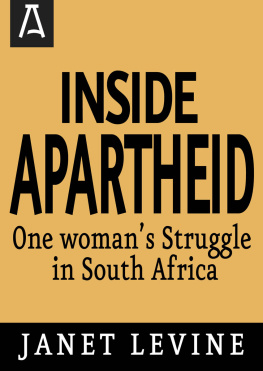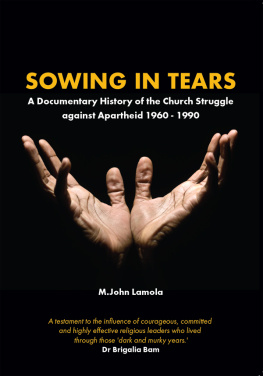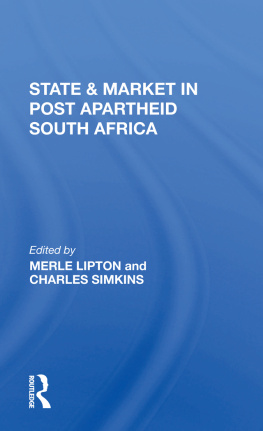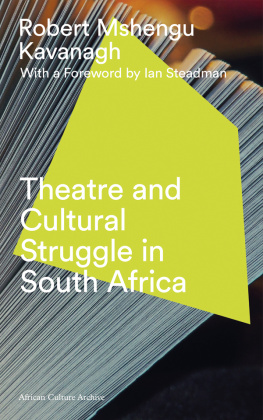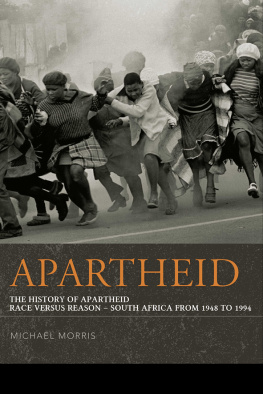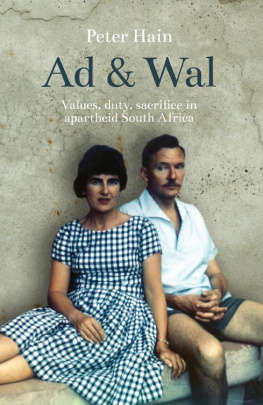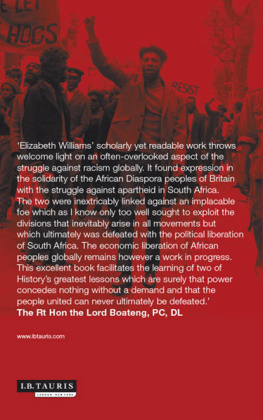Praise for
Inside Apartheid
This is a subjective but not self-indulgent account of [Levines] struggle to live with moral seriousness in a country where some of the lines of battle are drawn through the middle of the human heart.
The New York Times Book Review
Janet Levines autobiography Inside Apartheid is the memoir of the agony of conscience of a white liberal. Levine is an intelligent, experienced observer, and her views deserve to be taken seriously.
New York Review of Books
A compelling, chastening work.
Kirkus Reviews
This moving personal story sheds still more light on a tragic situation.
Publishers Weekly
Foreword
During the winter of 1986, I lived in the salubrious Johannesburg suburb of Parktown and traveled throughout South Africa, attempting with my husband to document apartheid in photographs and text. We lived as whites among whites, renting our house from a woman who still called Zimbabwe Rhodesia, billed us for silverware, dishes, and linens used by black guests in our home, and had once threatened a half-blind beggar with a spoon, telling him she would gouge his other eye out if he didnt leave her doorstep at once. She tended her English garden with care and doted on two apricot Lhasa apsos who seemed to her so much like offspring that she tinted her pale hair apricot. On Sunday mornings, Anglican hymns rose from the radio in her carriage house and drifted into our kitchen, scented with the cook smoke of meat grilled by blacks in the alley behind their houses, which resembled toolsheds in the white backyards. In my diary, I entered my observations under headings having to do with common human needs: shelter, clothing, sleep, food, transport, leisure, and the like.
On the subject of meat:
18 January 1986: Wed been given the wrong address for the house on Bristol Road in Saxonwold, but the woman welcomed us in to use the phone and offered us tea. If you should decide to take a house and need someone, I have a man here, father of my houseboy, just in from Zimbabwe. An older man, cooks and does yard work. As he is mature, you would have to pay him 200 rand there bouts a month [then $100 U.S.]. And youd have to buy his sack of mealies and the half pound of meat he gets each day. Be sure now to get the right kind of meat, servants rations. And cheap tea. They dont like tea bags. And youd have to provide one of those big metal pots. You mustnt let them take advantage. Dont let them eat from the table. Mustnt let them. Theyll show you the right kind of tea for them, the cheap kind, bulk tea. And the mealies. Do let me know if you can use him, wont you? And stop round once you get settled.
14 February 1986: By late afternoon the tear gas lifted from Atteridgeville. One woman is dead and thirty wounded. The police have refused to supply the tear gas formula to physicians attempting to treat the women. In todays Weekly Mail: I will never forget what I have seen. They killed my son-in-law in front of me. They cut his throat like a goats. They stripped his body and left it to rot in the village. I was not allowed to bury him.
Estelle came by to show me the contents of her blood-soaked bundle of butcher paper. This is the kind of meat the Africans eat. They cook it and cook it until the bones are soft. Im making it for the dogs. You see, they also love it.
19 February 1986: On the cut stone porch two days ago at dusk, as I tried to build a coal fire in the braai and failed, one of Estelles workers came over with wadded newspaper and a few kindling sticks, saying Madam, please, I will help you. With his bare hands he lifted the half-lit coals. I must have reached for him in a gesture of caution. He smiled at this as he stacked the paper and sticks in a lattice of breath and match-light. These are kaffir hands, madam, it is all right, [Kaffir: the derogatory name whites give to blacks.] They are not like yours. Kaffir hands. Feel no heat.
16 February 1986: While we were washing dishes, Dina said, We African people, we like the same foods as you, all the same, carrots, apples, vegetables all the same. But white women will tell you to buy us only mealies and meat. Thats all I had before, and if I wanted something like this pumpkin, I had to buy it from my salary. So I didnt have it very much. This is how you make the pumpkin: cut it like this, take the rind off, put it with brown sugar and oil on the top of the stove, and eat it when its soft. The whites dont like us African peoples. That is why they say we will only eat mealies and meat.
By means of such vignettes I had hoped to discover something of the texture of white life under apartheid and of its effects upon the minority whose identity it was intended to securethe identity of all four-and-a-half million whites who were complicitly involved in this crime, guilty of the sin of commission, a crime Janet Levine is not afraid to call genocide. She is also not afraid to point out that the program of forced removals in South Africa has only one precedent the removal of Jews (and others) by the Nazis to the death camps in eastern Europe. If this is true, then those of us who pleaded ignorance during the Holocaust or were born after it occurred are being tested again, and as Janet Levine admonishes, No one must say, as they did of that other genocide, that they did not know. If our ignorance permits us to bear the unrelieved sufferings of black South Africans, then our intuitive or unconscious recognition of this would compel us to protect our ignorance, as the Germans protected theirs.
Such books as Janet Levines Inside Apartheid do not further such protection. Rather, her work takes a hard look not only at the crime but at its perpetrators (white South Africans) and accomplices (among them, ourselves). It asks the questions we would be compelled to ask ourselves: if we had been Germans, or we were now white South Africans, what would we have done, what would we do, and what would happen if we acted morally and well?
The whites of South Africa have a culture very like our own; among them, white Americans feel, sometimes unnervingly, at home. We share with white South Africa the founding myth of an unstoried, artless land, uninhabited and awaiting our ancestors claim to it, by right of covenant or might. The land was ours, wrote Robert Frost, before we were the lands./ She was our land more than a hundred years/Before we were her people. Those who lived on the land before European contact were relegated by white South Africans to servitude, the hinterlands, and, more recently, to resettlement camps. Those who preceded Europeans in North America were annihilated and their survivors confined to reservations (a fact I was reminded of repeatedly by white South Africans attempting to justify the actions of the apartheid regime). Beyond this founding myth, our histories diverge, eroding empire in distinct ways, but sharing always the bond of European whiteness and its assumption of privilege. In the United States, whites became the majority, and in their ascendancy suppressed the founding genocide and built a nation, partly on the backs of enslaved Africans. Abolition, a moral justification for the economic war between the industrial North and the agricultural South, and a by-product of the northern victory, freed the slaves and replaced slavery with a segregated system of servitude protected by racial laws resembling those of apartheid. When the civil rights movement successfully challenged those racial laws, the system of economic segregation remained so effective that the majority of American blacks have experienced an actual decline in their standard of living relative to American whites during the last twenty years. How many of us, as whites, have attempted to counteract this decline?

